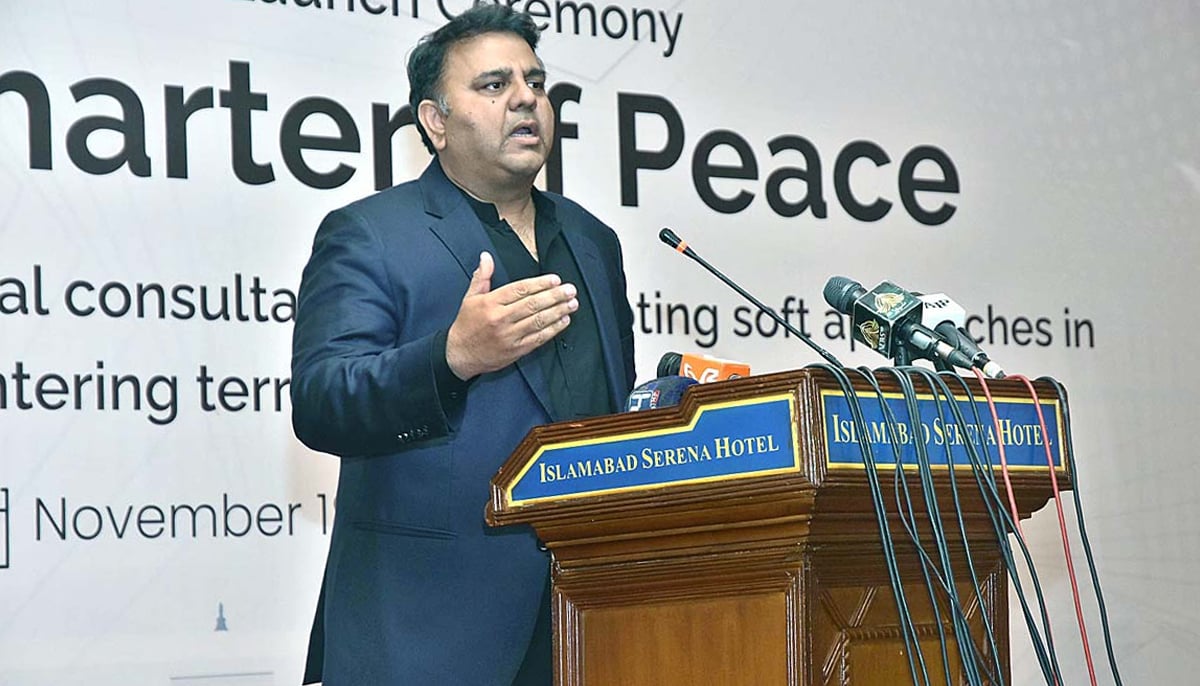Fawad says schools, colleges reason behind extremism in Pakistan
Chaudhry says state, government "not fully prepared" to deal with extremism
ISLAMABAD: It is schools and colleges that are the major reason behind extremism, not madressahs, as is the popular belief, Minister for Information and Broadcasting Fawad Chaudhry said Thursday.
Addressing the launching ceremony of “Charter of Peace”, organised by Pakistan Institute of Peace Studies, the information minister said: "In the 90s, teachers were appointed to preach extremism."
Chaudhry said the state and government are "not fully prepared" to deal with extremism, adding that they had to "take a step back" while dealing with the Tehreek-e-Labbaik Pakistan (TLP).
The TLP held violent protests in the country last month following which, on October 31, the government and the party reached a secret accord, within a few days of which the party was de-proscribed and its chief, Saad Rizvi, was released.
The information minister said the country faces "no danger from America or Europe". Pakistan faces "the biggest danger from within", he said.
Chaudhry lamented that the menace of extremism is one that could isolate and destroy a country, and unfortunately, Pakistan "was pushed" towards it for political and foreign policy reasons.
He noted that a person is labelled a "nonbeliever" if their views differ from the prevalent thought pattern found in society. "Islam teaches balance and peace. The teachings of Islam or any other religion are not the issue, the only issue is their interpretation."
'When writ of state ends, extremist elements begin to hold sway'
Shedding light on other matters, he said "we have destroyed our policing and administrative system" and have not even found an alternative for it.
"If you cannot even save the lives of the people, how will you create a soft change? A state which cannot establish its writ for a prolonged period cannot survive for long."
The information minister noted that when the writ of the state ends, extremist elements begin to hold sway. He added that upholding the law is crucial to bringing a positive change in society.
Chaudhry, lamenting that the institutions of numberdar, chowkidar and, thanedar had been "destroyed", said the people's lives cannot be saved unless the law is upheld.
"The state's only duty is to enforce the law. The existence of a state which cannot enforce the law will come into question, which will later lead to civil war," the information minister said.
He noted that in case of a civil war, the state's control would continue to diminish and "groups" will take over.
Chaudhry said that to root out extremism, the narrative surrounding it would have to be changed. The information minister said having an extremist point of view was not an issue, as people can have differing views — and no one could stop a person from thinking in such a manner.
"But, such a person cannot be allowed to attack the government with Kalashnikovs [...] having a different point of view and imposing it on others are two different things," he said.
The information minister said the state should ensure that no group has the "right to violence" so that diverse thinking can co-exist in society.
"When the state becomes weak, extremist groups become strong. When this happens and they ask the state that it will not follow a view other than theirs, then this is when we have a problem," he said.
Till the state does not guarantee the rule of law and successfully establish its writ, it cannot bring "soft change", he added.
-
Security forces gun down 30 terrorists in multiple IBOs in KP: ISPR
-
MQM-P calls for new province in Sindh
-
US report validates Pakistan military edge over India: PM
-
Banned TTP poses serious threat to Pakistan security: UNSC panel
-
CM Afridi clarifies remarks on by-poll after ECP requests army deployment
-
Dubai sees 3.2m Pakistani passengers in 2025 as airport sets new milestone
-
Security forces kill 23 Indian proxy terrorists in KP's Kurram
-
Pakistan to construct island to boost oil exploration: report












